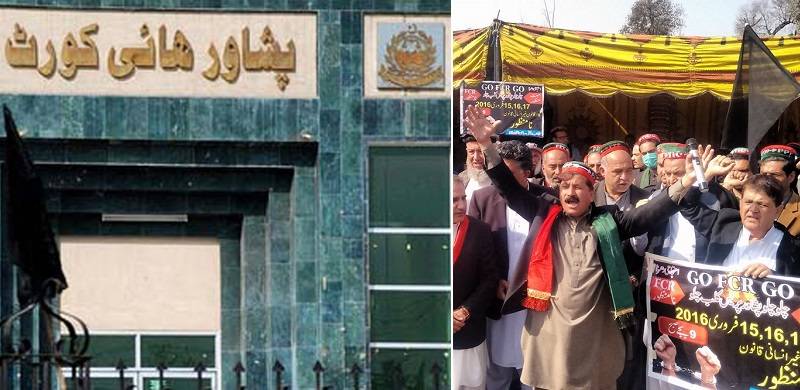
The Khyber Pakhtunkhwa (KP) government has decided to appoint Deputy Commissioners of the amalgamated tribal districts of Bajaur, Mohmand, Khyber, Orakzai, Kurram North and South Waziristan as Justices of Peace for their areas of jurisdiction. These powers will also be conferred on the Deputy Commissioners of the semi-settled areas of the tribal districts. The Khyber Pakhtunkhwa government conferred these powers on the Deputy Commissioners under Section 22 of the Criminal Code.
In this regard, the Department of Home Affairs and Tribal Affairs Khyber-Pakhtunkhwa said that the decision was taken to address the problems faced by the people in adopting the recently introduced police system in the merged districts, especially FIR registration and verification of documents for legal purposes.
But human rights activists and legal experts in the tribal areas consider these powers unconstitutional and argue that in other parts of the country, the powers of section 22A and B of the Criminal Code are vested in the judiciary. They argue that powers being given to the Deputy Commissioners is a violation of the Constitution of Pakistan.
Mohsin Dawar, central chairman of the National Democratic Movement (NDM) and a Member of the National Assembly tells The Friday Times–NayaDaur that the former FATA had been used as a laboratory before and that this is being done once again after the merger with Khyber-Pakhtunkhwa province. He adds that despite the fact that all stakeholders should be consulted, unilateral decisions are being made. Dawar further says, “It seems to us that the process of merging the tribal districts with the province is being derailed again.”
Deputy Commissioners under the jurisdiction of this law will also assist the police and courts in cases of arrests for trespassing crimes. DCs will now be legally responsible for preventing law and order violations in the merged districts.
Ali Azeem Afridi, a Peshawar High Court lawyer, has been watching the legislation for the merged districts. He says that in other districts, the judiciary has these powers, but in the tribal districts these powers are being vested in deputy commissioners. He intends to go to court and challenge the move, as it is a violation of the constitution.
Nisar Mohmand, a member of the Khyber-Pakhtunkhwa Assembly, says, “If giving judicial powers to deputy commissioners in the tribal districts were so useful and beneficial, then the deputy commissioners of the whole country should be given these powers.” In his view, the Deputy Commissioners were given so many powers in the days of the colonial-era Frontier Crime Regulation (FCR), but that once again such powers are being given to the bureaucracy. He also considers it unconstitutional and intends to take it up in the provincial assembly.
In this regard, the Department of Home Affairs and Tribal Affairs Khyber-Pakhtunkhwa said that the decision was taken to address the problems faced by the people in adopting the recently introduced police system in the merged districts, especially FIR registration and verification of documents for legal purposes.
But human rights activists and legal experts in the tribal areas consider these powers unconstitutional and argue that in other parts of the country, the powers of section 22A and B of the Criminal Code are vested in the judiciary. They argue that powers being given to the Deputy Commissioners is a violation of the Constitution of Pakistan.
Nisar Mohmand, a member of the Khyber-Pakhtunkhwa Assembly, says, “If giving judicial powers to deputy commissioners in the tribal districts were so useful and beneficial, then the deputy commissioners of the whole country should be given these powers”
Mohsin Dawar, central chairman of the National Democratic Movement (NDM) and a Member of the National Assembly tells The Friday Times–NayaDaur that the former FATA had been used as a laboratory before and that this is being done once again after the merger with Khyber-Pakhtunkhwa province. He adds that despite the fact that all stakeholders should be consulted, unilateral decisions are being made. Dawar further says, “It seems to us that the process of merging the tribal districts with the province is being derailed again.”
Deputy Commissioners under the jurisdiction of this law will also assist the police and courts in cases of arrests for trespassing crimes. DCs will now be legally responsible for preventing law and order violations in the merged districts.
Ali Azeem Afridi, a Peshawar High Court lawyer, has been watching the legislation for the merged districts. He says that in other districts, the judiciary has these powers, but in the tribal districts these powers are being vested in deputy commissioners. He intends to go to court and challenge the move, as it is a violation of the constitution.
Nisar Mohmand, a member of the Khyber-Pakhtunkhwa Assembly, says, “If giving judicial powers to deputy commissioners in the tribal districts were so useful and beneficial, then the deputy commissioners of the whole country should be given these powers.” In his view, the Deputy Commissioners were given so many powers in the days of the colonial-era Frontier Crime Regulation (FCR), but that once again such powers are being given to the bureaucracy. He also considers it unconstitutional and intends to take it up in the provincial assembly.

